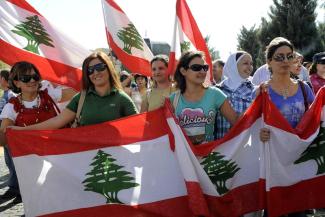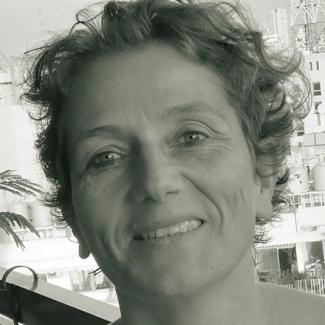Lebanon
A lack of political reform

Journalist Dalal Al-Bizri has lost faith in the prospect of political transformation in Lebanon. Her outlook was different in the spring of 2011, when tensions were boiling over in many Arab countries. At the time, thousands of people were taking to the streets not only in Tunisia and Egypt, but also in Beirut.
Dalal Al-Bizri was there: “I truly believed that we could accomplish something.” In Lebanon, demonstrators demanded that the influence of religion over politics and law must be reduced. They wanted electoral law to be reformed so secular forces would have chances of winning seats in the parliament and challenging the dominance of the long-established religious and political elite.
The role of religious communities
In Lebanon, religion means much more than simply being born into a faith and practicing the rituals of a religious community. The cedar state does not have a civil personal-status law. When it comes to matters like marriage, inheritance or divorce, members of the various religious communities are bound by the rules of their particular faith. Moreover, being a Sunni, Shia, Orthodox or Maronite Christian means to be part of a political, social and economic network.
Faith-based organisations have taken over the duties of the state. They run schools and hospitals, award scholarships, provide support to the underprivileged, help community members to find work and create jobs. The media are funded and controlled by the different political and religious groups. The country’s political leaders act like feudal lords; they are elected to represent their religious communities in parliament.
Jawad Adra of the polling agency and research centre Information International in Beirut describes the Lebanese as hostages of their political leaders: “They were captured and then fell in love with their kidnappers.” According to Adra, the leaders control resources the government should have, and they distribute them as personal favours in return for loyalty. At the same time, their power rests on fear-mongering, Adra adds: “The leaders stoke fears of other religious groups, and present themselves as the protectors of their own communities.”
The 2011 protests in Beirut
Adra estimates that at least a third of all Lebanese, from all religious communities, would like to see the confessional system reformed or abolished, but that they have lost hope that change will ever come. In 2011, many Lebanese demonstrated for the creation of a civil personal-status law in order to reform the prevailing confessional system.
According to Adra, Lebanon’s political system has repeatedly led to tensions between religious communities, cemented their isolation from one another and laid the groundwork for violent clashes . Nonetheless, the protests of 2011 eventually died away. Ultimately, they had no effect.
Many Lebanese probably thought it was too risky to call for political reforms or an end to a system that has been in place for decades. Many citizens feared, moreover, that changes would plunge the country into chaos and lead to more violence or even a new civil war.
Lebanon has experienced 15 years of civil war from 1975 to 1990. The conflict claimed the lives of around 150,000 people, most of them civilians. It was caused by a variety of factors: social tensions, the political and military activities of Palestinians in Lebanon as well as regional influences.
The war continues to shape the country to this day. Many of the warlords are now members of parliament. Although the fronts did not always form along religious lines, the war left deep divisions in Lebanese society. The number of interfaith neighbourhoods has steeply declined, and so has the one of interfaith marriages.
Tensions between Sunnis and Shi’ites
Today, the war in neighbouring Syria is creating new tensions between religious communities in Lebanon. Violence keeps flaring up between Shia and Sunni Lebanese, between villages in the Bekka Valley in the east of the country and between Sunni and Alawite neighbourhoods in Tripoli in the north. In 2013 and 2014, bombings and suicide attacks rocked cities throughout the entire country. Over 150 people died. The attackers, radicalised Sunnis and Shias, carry violence from Syria .
Asharaf Haidar lives in Tarik Al-Jadida, a predominantly Sunni district of Beirut. He expresses the fear that is on many people’s minds: “We are worried that the conflict between Sunnis and Shias in Lebanon could escalate.” He blames Lebanese politicians for fanning the flames. Lebanese army tanks stand at the edge of Tarik Al-Jadida. They are supposed to prevent angry young Sunnis from clashing with Shias from the neighbouring district.
Mohammed Sammak is the 77-year-old secretary-general of the Islamic Spiritual Summit, which includes Sunni, Shia, Druze and Alawite members. The Summit tries to act as a mediator in cases of violence between different Muslim denominations. In Sammak’s eyes, tensions between Sunnis and Shias are not an expression of religious fanaticism, but as one of “partisan, political fanaticism”. He believes that current events in Lebanon are a mirror of the political situation in the region. “If a meeting were to take place tomorrow between Iran, Saudi Arabia and the other Persian Gulf countries, tensions here in Lebanon would immediately ease.”
Theologians as mediators
Ali Fadlallah, a famous Shia religious scholar, agrees with this assessment: “It’s understandable that Lebanese sympathise with the side that they have religious ties to. This is precisely the scenario in which we as religious scholars can intervene to help calm people down.”
The 56-year-old delivers sermons every Friday at the Al-Hassanain Mosque in Harat Hreik, a neighbourhood in south Beirut. The capital’s southern suburbs are predominantly Shia. Many residents are sympathetic to Hezbollah. When the Syrian Army achieves a victory against the armed opposition in Syria, celebratory gunfire can be heard, and sweets are sold on the streets.
Young men from these neighbourhoods travel to Syria to fight in the war. Fadlallah thinks this is a mistake. His advice is: “We need to have dialogue as soon as possible and not pour more fuel on the fire.”
His colleague Mohammed Sammak seems resigned however. He admits that his own activities and those of fellow religious leaders are not effective enough: “If our approach was working, the situation would have improved by now. But we only have words. All we can do is appeal to people’s reason.”
Mona Naggar is a journalist and media trainer. She lives in Beirut.
mona.naggar@googlemail.com







